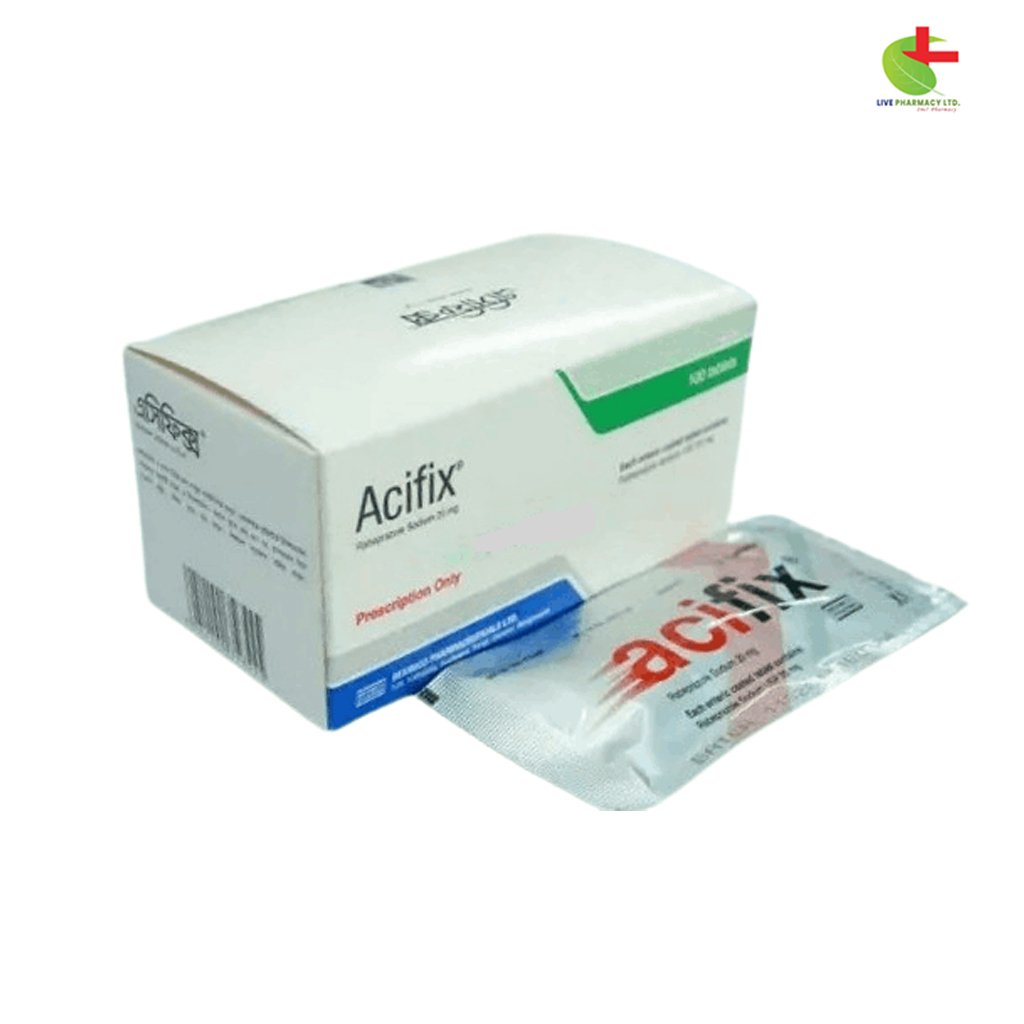Acifix 20
70.00৳ Strip
- Acifix Gastro-resistant Tablets effectively treat active duodenal and benign gastric ulcers, symptomatic GERD, and Zollinger-Ellison Syndrome.
- Utilizing Rabeprazole, a potent proton pump inhibitor, it suppresses gastric acid production for rapid relief.
- Suitable for both short-term and long-term management, Acifix also aids in eradicating Helicobacter pylori when used with antibiotics.
- Take once daily in the morning, and avoid chewing or crushing the tablets.
 Brand
Brand
|
Beximco Pharmaceuticals Ltd |
|---|---|
 Generics
Generics
|
Rabeprazole Sodium |
 Type
Type
|
Tablet |
Indications
Acifix Gastro-resistant tablets are used for:
- Treating active duodenal and benign gastric ulcers.
- Managing symptomatic erosive or ulcerative gastro-esophageal reflux disease (GERD).
- Long-term maintenance of GERD.
- Alleviating symptoms of moderate to severe GERD.
- Addressing Zollinger-Ellison Syndrome.
- Eradicating Helicobacter pylori in peptic ulcer disease as part of a combination therapy.
Pharmacology
Acifix, containing Rabeprazole, works as a proton pump inhibitor by blocking the H+/K+-ATPase enzyme on the gastric parietal cells’ surface. This action suppresses gastric acid secretion effectively. Rabeprazole is known for its rapid onset and safety compared to other acid-reducing medications.
Dosage & Administration
- For ulcers and GERD: 20 mg once daily in the morning. Healing times vary, with some cases needing up to an additional 4-6 weeks.
- Long-term GERD management: Maintenance dose of 10-20 mg daily.
- Severe GERD symptoms: 10 mg daily; can be adjusted based on symptom control.
- Pediatric dosing: 5-10 mg daily depending on weight.
- Zollinger-Ellison Syndrome: Start with 60 mg daily, adjustable to 120 mg/day.
Administration: Take tablets whole, before meals, and not chewed or crushed.
Interactions
Avoid combining Acifix with ketoconazole, itraconazole, or atazanavir due to potential interactions. No issues with liquid antacids.
Contraindications
Do not use if allergic to Rabeprazole, its components, or other proton pump inhibitors. Not suitable for use during pregnancy or breastfeeding.
Side Effects
Common side effects include headache, dizziness, gastrointestinal discomfort, and dry mouth. Serious effects are rare but can include blood dyscrasias and hepatic enzyme abnormalities.
Pregnancy & Lactation
Category C: Use only if benefits outweigh risks. Caution advised during breastfeeding.
Precautions & Warnings
- Long-term use: Regular monitoring required for bone health and potential side effects.
- Potential risks: May increase fracture risk, affect vitamin B12 absorption, and rarely cause subacute cutaneous lupus erythematosus (SCLE).
- Special considerations: No dosage adjustment needed for renal or hepatic impairment.
Therapeutic Class
Proton Pump Inhibitor
Storage Conditions
Store below 30°C, away from light and moisture. Keep out of reach of children.













Reviews
There are no reviews yet.